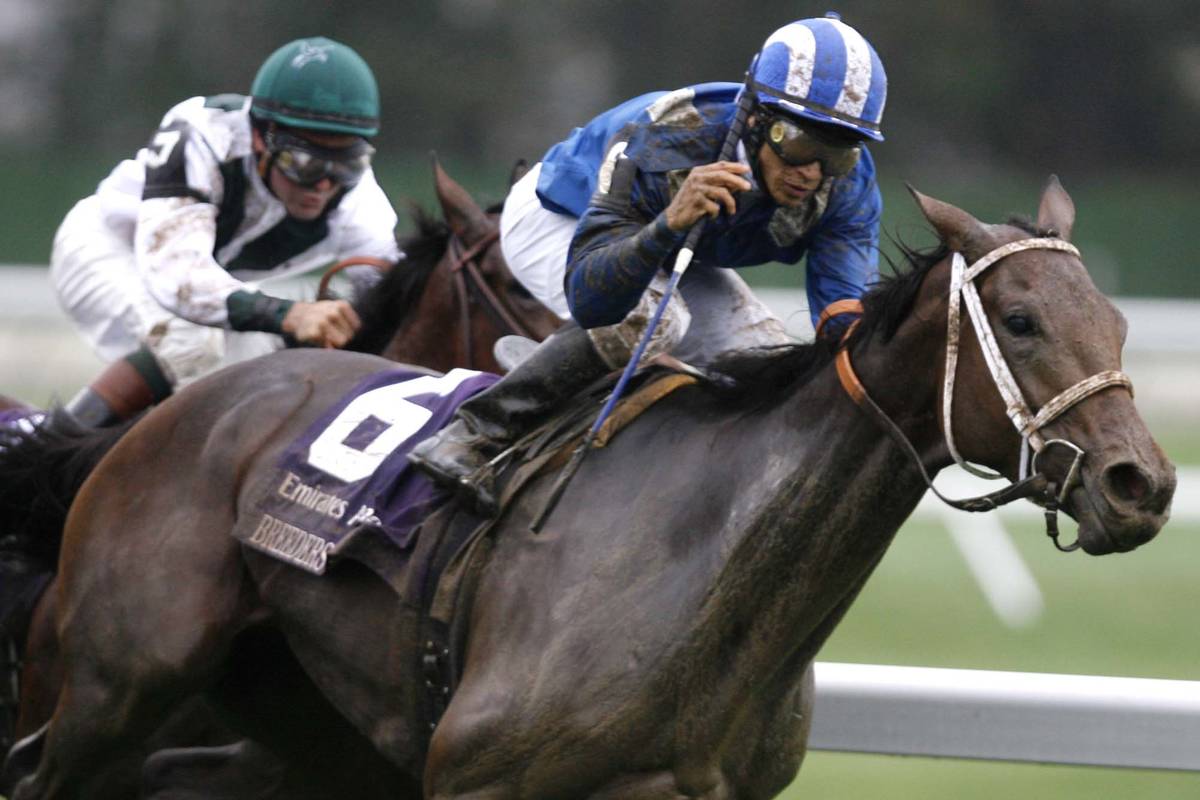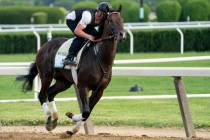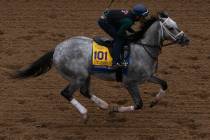Monmouth Park’s ‘no-whip’ rule ignites controversy
Imagine you’re driving in a NASCAR race at Talladega and suddenly you realize the steering wheel isn’t responding to your attempts to negotiate the turns. When you glance to your left and right, you see that other drivers also are struggling to control their racing machines.
Sounds like a bad dream, but it’s a rough analogy for the situation confronting thoroughbred jockeys at New Jersey’s Monmouth Park as they attempt to navigate a new “no whip” rule imposed by the state’s Horse Racing Commission.
The rule — the strictest in the U.S. – allows jockeys to carry a riding crop but bars its use “except for reasons of safety.”
Hitting a horse to encourage it to run faster or even waving the stick at a horse during a race — a common technique used to keep a mount focused on running — can result in a $500 fine and/or five-day suspension for the first offense, with the penalty potentially doubling with each occurrence, according to Terry Meyocks, CEO of the Jockeys’ Guild.
No serious incidents have occurred in the first seven days of racing at the seaside oval, which opened its 53-day meeting on May 28. But Meyocks said he considers that fortunate, calling the rule handed down by the racing commission in September “irresponsible” and “dangerous.”
“It’s unfortunate for everybody, for our industry,” he said of the rule, which Hall of Fame jockey John Velazquez, co-chair of the Jockeys’ Guild board, has compared to playing Russian roulette. Some top riders at Monmouth, including “Jersey” Joe Bravo, Anthony Gallardo and Daniel Centeno, have said they will ride elsewhere this summer, with the former saying he will shift his tack to Del Mar.
The guild has filed a lawsuit seeking to block the rule, but its request for an emergency stay was denied and a court is not expected to hear the challenge until later this year.
Kathy Guillermo, a senior vice president with People for the Ethical Treatment of Animals (PETA), doesn’t buy the safety argument and said the jockeys are ignoring growing public sentiment opposing the practice of whipping horses.
She pointed to a three-year study in Australia that found banning the use of whips during races did not result in “statistically significant differences” in terms of increased risk, jockey behavior or race finishing times.
“We do not have a problem with jockeys carrying a whip and, if they get in a situation, using it,” she said. “… But the aspect of this that I don’t think the jockeys are thinking of is what it looks like to the public.”
Another important constituency in the debate is bettors, though it’s not yet clear whether they will redirect their wagering dollars to other venues in response to the rule. Handle has been down in the early stages of the Monmouth meet, but bad weather and short fields may have played a role in suppressing wagering.
The parade of winning favorites at Monmouth, which has seen the chalk win nearly 48 percent of all races heading into Friday’s card, also may be a factor.
This is all likely just a preview of the debate that will surround the debut of the new federal Horseracing Integrity and Safety Act next year. The act, approved by Congress in December, created a federal body to design and implement uniform national medication and safety standards, including whip use.
Mike Brunker’s horse racing column appears Fridays. He can be reached at mbrunker@reviewjournal.com or 702-383-4656. Follow @mike_brunker on Twitter.
Ellis Starr's Salvator Mile Stakes analysis
Ny Traffic gets top billing in this year's Salvator Mile Stakes by virtue of a strong seven-length win in his 4-year-old debut last month. That win came at the distance of 7 furlongs and earned a 99 Equibase Speed Figure, which is highly likely to be improved upon significantly in his second start off the layoff and on the stretch out to two turns. Last spring and summer, Ny Traffic proved competitive with top 3-year-olds Maxfield and then Authentic when second or third in three straight graded stakes – the Risen Star, Louisiana Derby and Matt Winn. Next came the Haskell Stakes at Monmouth last July in which Ny Traffic ran the best race of his career, earning a 107 figure and coming up just a nose shy of beating subsequent Kentucky Derby winner Authentic. Following an eighth-place finish in the Derby and a ninth-place effort in the Preakness, Ny Traffic was given time off to mature and he certainly did so as evidenced by his comeback last month. With Paco Lopez returning to the saddle to ride him as he did in the Haskell, Ny Traffic may be the one to beat in this race.
Croatian is the veteran in this field, having run 31 times. This will be only his second career start in a stakes race and the other, back in March of last year, was a poor effort in which he finished sixth. However, Croatian was claimed shortly thereafter by Jerry Hollendorfer and reeled off four straight top efforts, including two wins and a defeat by a neck, all at Monmouth. The best of those, last September, earned Croatian a 107 figure — on par with the figure Ny Traffic earned in the Haskell. Also similar to Ny Traffic, Croatian stretches out off a sprint prep following a layoff (October to April). In that sprint, Croatian finished fourth, beaten just two lengths by the winner, with a 97 figure very similar to NY Traffic. As such, it is very likely Croatian will take a big step forward and if he does and can duplicate any of his four efforts over the track last summer, he could post the upset or at the least run much better than his high odds suggest he will.
Pirate's Punch has one big question mark regarding his chances in that he is making his first start of 2021, returning off a seven month layoff. Pirate's Punch won the 2020 Salvator Mile with a strong 110 figure and did so fairly easily, beating a field of eight by two lengths as the 2-1 betting favorite. He had won the Philip H. Iselin Stakes one month prior to that but was disqualified and placed second. Following a last of 12 finish in the Breeders' Cup Dirt Mile, Pirate's Punch was given time to rest and his recent workouts indicated he is in excellent physical form. Additionally, Pirate's Punch won his 2020 debut with a 112 figure but that was following two months off and seven months can be quite different. Nevertheless as he's proven at the level and over the track, Pirate's Punch rounds out a trio I feel stand out against the others in this year's Salvator Mile Stakes.
The rest of the field, with their best Equibase Speed Figures: Bal Harbour (108); Basin (104); Galerio (107); Green Light Go (99); Informative (103); West Will Power (102); and War Stopper (103).
Ellis Starr is the national racing analyst for Equibase. Visit the Equibase website for more on the race or to purchase handicapping products.


















